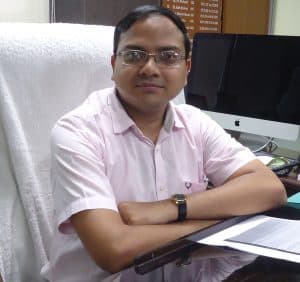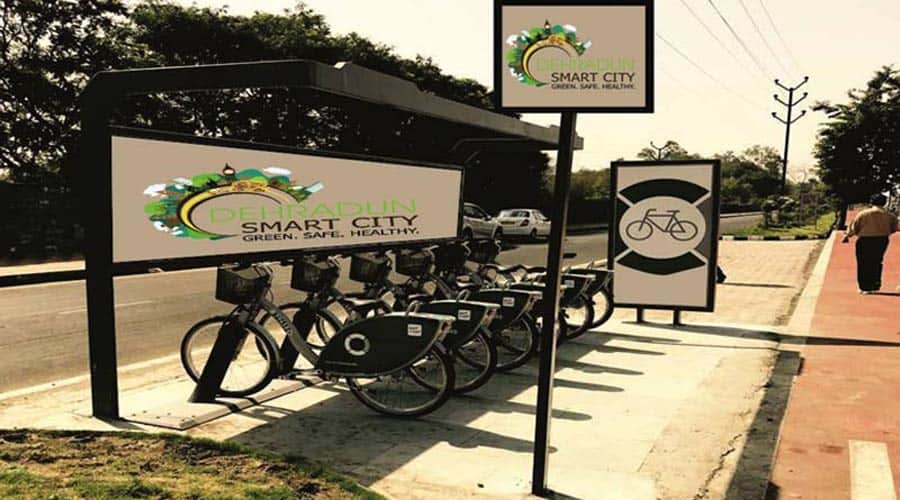Shortlisted for the National Smart Cities Mission in 2017, Dehradun, capital of Himalayan state of Uttarakhand, inaugurated its most ambitious smart city project on December 25th, 2019. The Doon Integrated Control & Command Centre (DICCC), built at a cost of Rs. 294.41 crore, will be the nerve centre coordinating all the smart city projects and work towards unification and ease of delivery of civic and urban services.
Dr Ashish Kumar Srivastava (IAS), Chief Executive Officer of the smart city mission in the city, is piloting the different smart city projects that include schemes like Smart Water ATMs (Rs 1.98 cr), Smart Toilet (Rs 1.81 cr) and Smart Schools (Rs 5.96 cr). Work on Smart Roads (Rs 203.23 cr) is currently underway. Citizens have reacted positively and are cooperating in the implementation of Smart City projects.
In an interview with Citizen Matters, Dr Ashish Srivastava, who is also vice-chairman of the Mussoorie-Dehradun Development Authority (MDDA) besides serving as additional secretary to the chief minister, said that DICC is maintaining sustained communication with Dehradun’s citizens. He also spoke about the various projects underway and those in the pipeline.
Excerpts from the interview:
From three back to back rejections to Rank 22 on January 3, 2020, how would you describe DSCL’s journey so far?
In the first three rounds, our proposal was for greenfield projects. But in an existing capital city, the Union Government was asking for brownfield projects in which a few interventions in the city’s existing infrastructure could make the city smart. So in our new proposal, we selected an area within two-kilometre radius of the Clock Tower, the heart of the city, which was accepted in the fourth round, when we were ranked 76th.
When you start any new project there are various policy challenges and issues that take time to resolve — setting up a Special Purpose Vehicle (SPV), creating government protocols/procedures, delegation of power to the SPV, getting office space, appointing qualified people and many other issues. It took us one and a half years to get all this up and running.
We started our journey in October 2018. In December 2018, DSCL’s rank was 99. Today, our rank is 24. All our projects are on track. We are done with almost all the tendering process. Almost 99 per cent work orders from the smart city mission budget have also been allotted. A few tenders are still left but we are hopeful we will be able to issue them by January end.
Most projects are underway. We complete our tenure of five years in 2023, but we are trying to finish the projects by 2022.
What are the key smart city projects?
Smart city has two types of projects; first, for the entire city, including the entire municipal limit and second for a selected area, known as Area Based Development (ABD). The ABD for Dehradun spans across the ten wards that we have selected within the two kilometre radius of the clock tower. For pan city, projects will include IT components.
The difference between a normal and a smart city is basically the unification of services. An Integrated Control and Command Centre (ICCC) will integrate all the essential services for citizens of the city. Smart roads, one of our pet projects work on which has already started, will have proper sewer lines, storm water drains, multi-utility ducts, EV charging stations and sitting spaces. Also, we are working to ensure infrastructure created is easily accessible to specially-abled people and easily accessible to them.
Water metering and installing Supervisory Control and Data Acquisition (SCADA) systems in water lines to minimise non-revenue water loss, is another important smart city project we are planning to implement. SCADA will also monitor consumption patterns and promote judicious use of water.
How is DSCL ensuring a balance between smart city projects and the city’s sustainable growth?
Environment holds a critical place in Dehradun’s smart city projects. We have two major projects for greening public places. One, a greenery-based project in Paltan Bazaar, which is currently very disorganized. We are completely pedestrianising it and undertaking façade improvement. The objective is to convert the market into a tourist destination which will reflect the identity of the city to visitors.
The second project is a complete green transformation of the parade ground, located in the centre of the city. We are trying to create a green area by merging Gandhi Park and Parade Ground, work on which has started.
Encouraging and enabling the habit of walking and cycling among citizens is one of the core focus of the smart city project. This saves the environment and has immense health benefits. For plantation drives, we will be using only native species of plants of Doon Valley. This will help with landscaping too.
We have issued the Letter of Agreement for electric buses. We are buying 30 electric buses on Gross Cost Contract (GCC) model which will connect the city in a criss-cross network. Our target is to bring almost 45 per cent of the city’s population on public transport. Environment conservation and reduction in road congestion will be two prime benefits from this.
Smart parking is another smart city project. But citizens have complained about high prices. What has been the progress and impact of the project so far?
We implemented smart parking as a pilot project between Silver City Mall and Clock Tower (A 5-km stretch, meant for road side parking). It has only been a year and we have received overwhelming response from citizens as it has eased their parking woes. The Traffic Police Directorate has acknowledged that vehicles are now getting parked in a systemic manner and not haphazardly and that traffic congestion has reduced drastically. They have requested us to create more such smart parking spaces.
All over the world, parking on the road is expensive. But we immediately reviewed prices after we received feedback. The current rate of Rs 30 per hour is being levied very judiciously. The most heartening feedback is that senior citizens and women drivers in the city are getting easy access to parking. As per the data available to us, smart parking has been used over 1,20,000 times.
We have also been able to generate an income of Rs 50 lakh so far from the smart parking system. After deduction of charges to the company managing the parking spaces, the rest will be utilised by a statutory committee comprising MDDA, Municipal Corporation Dehradun, Police and the district administration.
Pan city review and joint inspections for creating more such spaces in the city is underway.
How can ICCC, one of your pet projects, ensure robust citizen engagement?
ICCC is the city’s nervous system. Traffic control, crowd management, emergency and other civic services like solid waste management, public grievances, water supply etc will all be coordinated by ICCC. Almost 12 government departments responsible for creating new infrastructure and maintaining old infrastructure are currently working in silos. Inter-department coordination is the key challenge. ICCC integrates all these departments which will result in smooth functioning and robust service delivery.
We launched ICCC on December 25th, on the occasion of ‘Good Governance Day’, and kick started two modules of the ICCC. One is variable sign boards, to give citizens real time information on weather conditions, climate and traffic movement. The second is installing a network of cameras at three or four locations. These cameras will help in speed detection, automatic plate reading etc.
The remaining fourteen modules, which will cover areas like waste management and redressal of public grievances, will be activated by June 2020. We plan to use ICCC as the Master Data Centre for Kumbh Mela scheduled to be organized in Haridwar in 2021.

